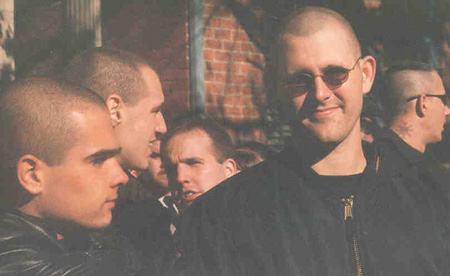
The National Annoyance continues to finish itself off with a lawsuit from members suing the top officers.
Daily Press
GLOUCESTER, VA — An internal feud of a high-profile organization in the national white supremacy movement has spilled over into Gloucester, with six members of the National Alliance asking a judge to remove the group’s three top officers — one of whom lives in the Guinea area — and to issue a judgment against them of $2 million.
The lawsuit, filed in Gloucester County Circuit Court, names as defendants Erich Gliebe, Ryan Maziarka and Jayne Cartwright, the president, vice president and treasurer of the National Alliance. Maziarka lives with his common-law wife and three children on Kings Creek Road in Gloucester; Gliebe and Cartwright live in different Ohio cities.
Virginia State Corporation Commission records show the National Alliance is a registered corporation and lists Maziarka as vice president and his Gloucester home as the organization’s national address.
Founded by William Pierce, the National Alliance has crumbled since the death of its charismatic leader a dozen years ago. Born in 1933, Pierce was a former physics professor and a neo-Nazi who wrote “The Turner Diaries,” a book that’s been hailed as the bible of the racist right and that inspired 1995 Oklahoma City bomber Timothy McVeigh, according to the Southern Poverty Law Center, which tracks extremist groups.
Pierce formed the National Alliance in Northern Virginia in the early 1970s before moving its headquarters to West Virginia. Spouting a virulent anti-Semitic or neo-Nazi ideology, Pierce expanded the National Alliance’s reach through his writing, speeches and music business, according to the SPLC.
Around the time of Pierce’s death in 2002, the National Alliance had 1,400 members and a paid national staff of 17, according to the SPLC. Yet today the organization is a “joke,” writes Mark Plotok of the SPLC.
The lawsuit pitting members against the National Alliance board lauds Pierce’s leadership and accuses Gliebe of mismanaging the organization, using the organization as his personal “piggy bank” and of bribing or attempting to bribe board members.
In a phone interview, Maziarka declined to discuss the specifics of the lawsuit other than to say the allegations aren’t true.
“I believe it’s false,” Maziarka said.
| Ryan Maziarka, in sunglasses, photographed June 12,2002 in York, PA |
A white supremacist past
In 1994, at the age of 18, Maziarka gained notoriety when he spray-painted racial epithets on a predominantly black church in the Fox Hill section of Hampton. Maziarka, who avowed at the time that he was a skinhead, wrote “Leave now or else” and “White power” on the church.
Maziarka was convicted of defacing the church in 1995 and handed a five-year prison sentence, although three years were suspended. That same year Maziarka was also convicted of possessing a sawed-off shotgun and sentenced to six years in prison, all of it suspended.
“I was brought up in Phoebus poor and white,” Maziarka said. “It was rough. You can’t really judge me unless you walk a mile in my shoes.”
Maziarka returned to the headlines in 1997 when the Virginia Department of Motor Vehicles recalled his license plate imprinted with letters “ZYKLON B” — a cyanide gas used at Auschwitz and other Nazi concentration camps to kill hundreds of thousands of Jews and other prisoners.
The following year, 1998, Maziarka moved to the Guinea area of Gloucester with Angela Forbes, his common-law wife. Maziarka and Forbes own 15 acres with a large house, paying $124,000 for the property in 1998, according to county documents.
The couple has refinanced the home several times over the years, most recently in 2012 for $180,000, county records show.
In 2008, Maziarka received an act of clemency in the form of a “restoration of rights” from then-Gov. Tim Kaine. Maziarka applied for the restoration of rights, but a request by the Daily Press for a copy of his application on file with the Library of Virginia was denied.
Records such as Maziarka’s contain “privacy-protected information, and as such are restricted from public access for 75 years from the date of creation” by state law, said Anita Vannucci, records analysis section coordinator for the Library of Virginia.
Kaine’s act restored Maziarka’s right to vote — as a convicted felon he was barred from casting a ballot — and set in motion his ability to possess and carry a firearm.
In December 2008, Maziarka secured a Gloucester Circuit Court judge’s approval on his request to possess and carry a firearm. The 2008 order, signed by Thomas N. Nance, allowed Maziarka to possess and carry a firearm for the “purposes of lawful target shooting and hunting,” according to court documents.
But the Virginia State Police advised Maziarka that he could not purchase a firearm or have one in his possession based on the restrictiveness of the phrase “for the purpose of lawful target shooting and hunting,” according to court documents. In November 2009, Maziarka had the restrictive phrase deleted and was able to obtain permission to carry a firearm.



More Stories
What happened to Jared Taylor?
Had a great time at the RNC (mostly because we’re nuts)!
All Out for April 23, Stone Mountain Georgia